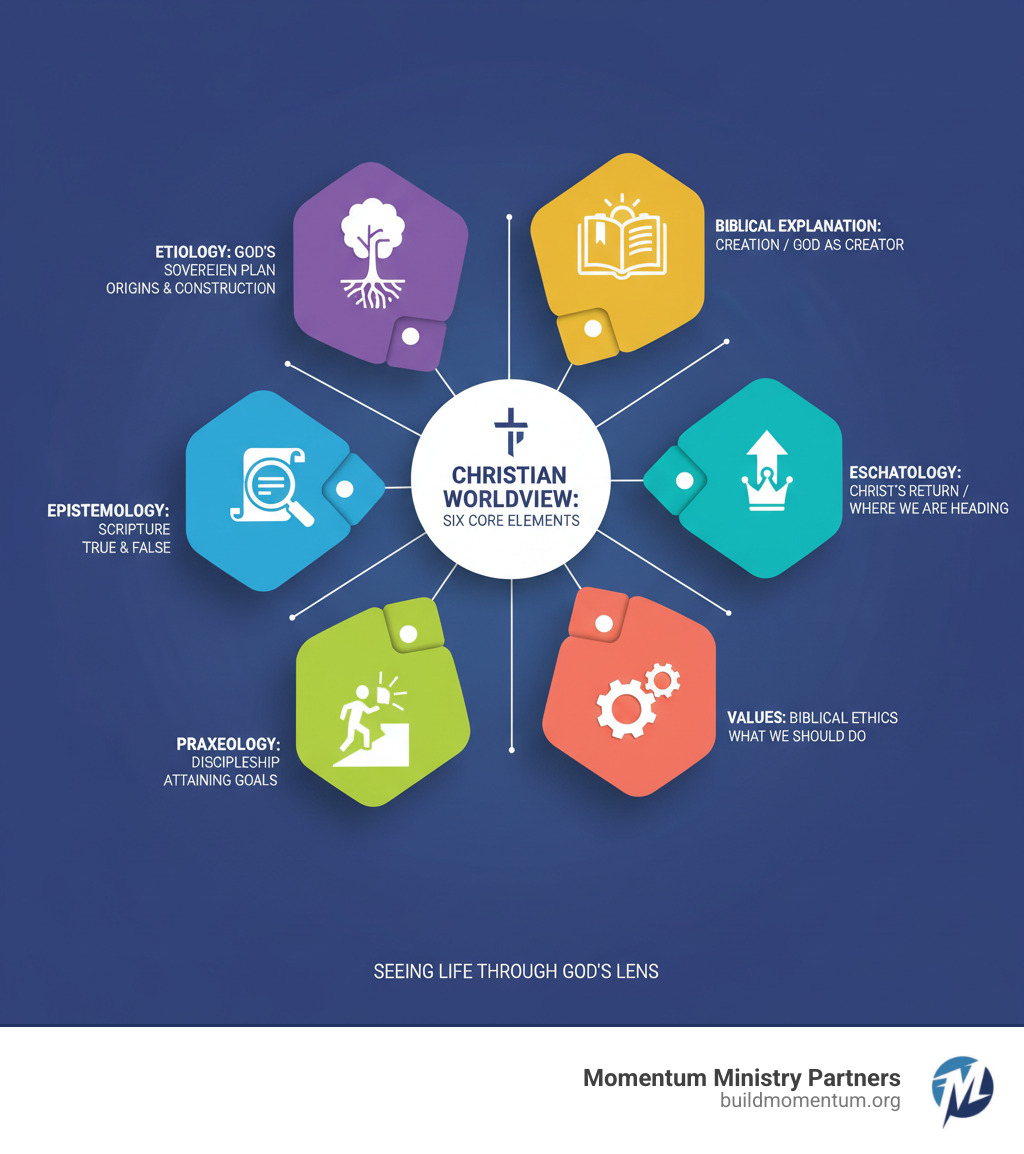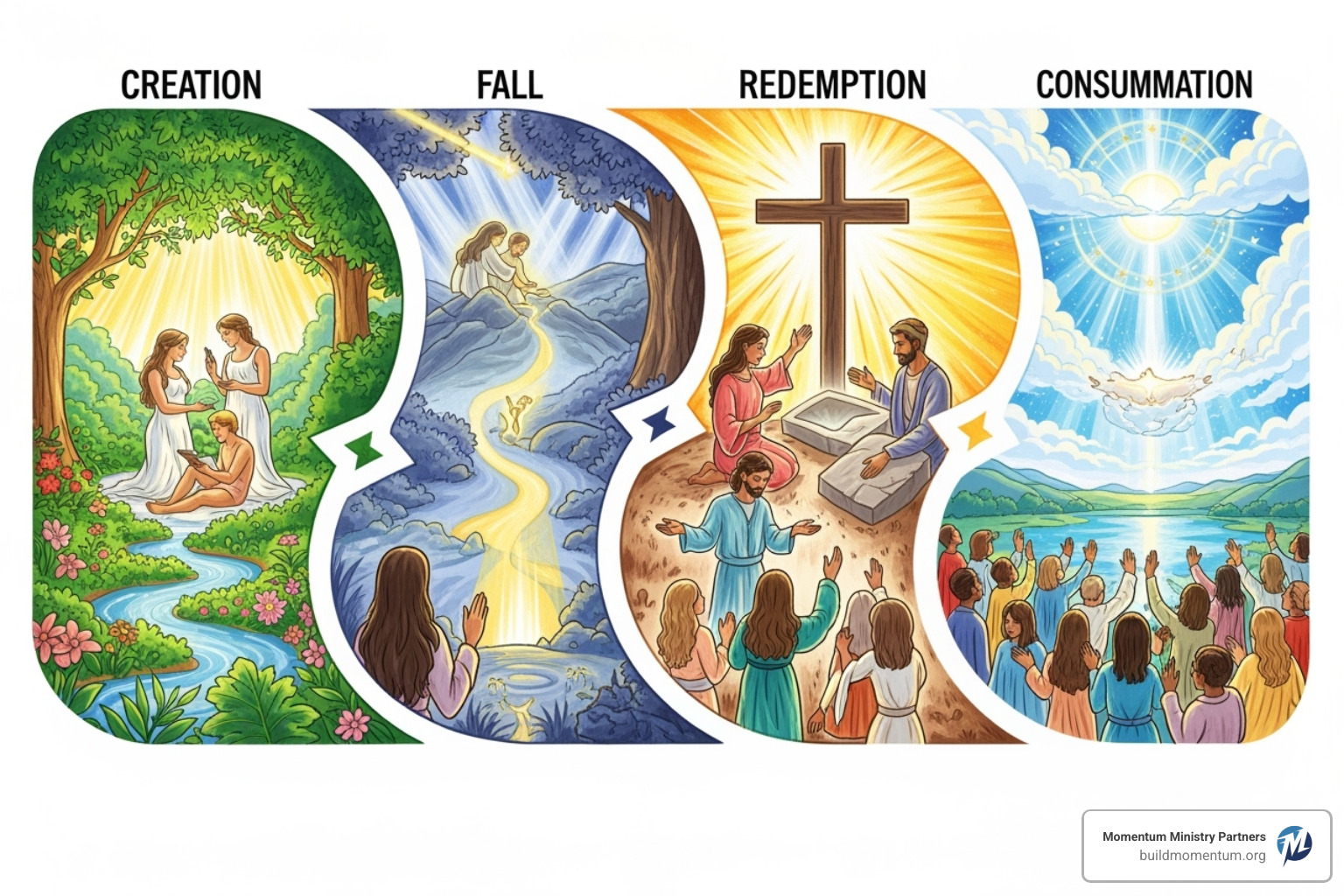Why Every Christian Leader Needs to Understand Worldview
A Christian world view is the framework of ideas and beliefs through which a Christian interprets the world and interacts with it. It’s like wearing glasses that help you see life clearly through God’s truth.
Quick Answer: What is a Christian Worldview?
- Definition: A comprehensive way of understanding reality based on Biblical truth
- Foundation: Built on Creation, Fall, Redemption, and Consummation
- Purpose: Shapes how Christians think, decide, and act in every area of life
- Core Belief: God is the source of all truth and meaning
- Application: Influences everything from career choices to cultural engagement
Everyone has a worldview, whether they realize it or not. As one researcher put it, it’s like asking a fish to describe water – we’re often unaware of the lens through which we view reality.
The statistics are sobering. According to the Barna Research Group, only 4 percent of Americans have a truly Biblical worldview. Even among born-again believers, that number rises to just 9 percent.
This means most Christians are living with a fragmented understanding of their faith. They believe in Jesus but haven’t connected those beliefs to a coherent way of thinking about work, relationships, politics, and culture.
Why does this matter for church leaders?
When young people leave for college or enter the workforce without a solid Biblical framework, they’re vulnerable. They absorb secular ideas about truth, morality, and purpose without even realizing it. The result? Confused faith and compromised witness.
I’m Jeff Bogue, and in over 30 years of pastoral ministry, I’ve seen how a solid Christian world view transforms believers and entire church communities. Through my work with Momentum Ministry Partners, I’m committed to equipping the next generation of leaders to think Biblically about every area of life.

The Core Components of a Christian Worldview
Think of a Christian world view as God’s grand story – one that makes sense of everything from the evening news to your personal struggles. This isn’t just abstract theology; it’s a practical framework that helps us understand where we came from, what went wrong, how it’s being fixed, and where we’re headed.
The Biblical narrative unfolds in four beautiful acts: Creation, Fall, Redemption, and Consummation. These aren’t just ancient stories – they’re the foundation for how we understand reality itself.

Creation: Where Did We Come From?
Here’s where our story begins – and what a beginning it is! A Christian world view declares that we didn’t evolve from primordial soup or emerge from cosmic chance. We came from the heart and mind of a loving Creator.
The Genesis account reveals that God created everything out of nothing (ex nihilo). He didn’t need pre-existing materials; He simply spoke, and galaxies burst into existence.
Crucially, you were made in God’s image. This means you’re not just another biological organism. You possess rationality, morality, creativity, and the capacity for relationship. You can think, love, create, and connect with your Creator.
This understanding changes everything. Your life has inherent meaning and purpose because you reflect the character of God Himself. Every person you meet – regardless of age, ability, or background – carries this same divine imprint. That’s why human life is sacred and why we’re called to love and serve our Creator.
The Fall: What Went Wrong?
If God created everything good, why does our world feel so broken? Why do we see suffering, injustice, and pain everywhere we look?
The Fall answers this question with sobering honesty. Sin entered God’s perfect world, and it changed everything. This isn’t just about people making bad choices – though we certainly do that. It’s about a fundamental corruption in human nature itself.
Romans 3:23 puts it plainly: “All have sinned and fall short of the glory of God.” This means every single person is affected by sin’s devastating impact. We’re alienated from God, from each other, and even from ourselves.
Think about it – why do marriages struggle? Why do nations go to war? Why do we feel that nagging emptiness even when everything seems to be going well? The Fall explains the brokenness and suffering that mark our human experience.
This might sound depressing, but recognizing our condition is actually the first step toward hope. We can’t fix what we won’t acknowledge is broken.
Redemption: What is the Solution?
Here’s where the Christian world view becomes the greatest story ever told. God didn’t abandon His broken creation – He entered it to rescue us.
Jesus Christ is God’s solution to the problem of sin. Through His perfect life, sacrificial death, and victorious resurrection, Jesus made atonement possible. He bridged the gap between holy God and sinful humanity.
John 3:16 captures this incredible truth: “For God so loved the world that he gave his one and only Son, that whoever believes in him shall not perish but have eternal life.”
This is salvation by grace, not by our efforts or good works. Jesus offers us forgiveness, cleanses us from sin, and gives us a new nature. We can actually be transformed from the inside out – that’s the power of redemption.
At Momentum Ministry Partners, this message of redemption drives everything we do. We’ve seen how this truth transforms lives and communities. If you’re feeling called to share this hope with others around the world, we’d love to have you learn more about our Christian mission trips.
Consummation: Where Are We Going?
The final chapter of God’s story is still being written, but we know how it ends – and it’s glorious.
God has a sovereign plan that’s moving history toward a specific destination. This isn’t wishful thinking or religious optimism – it’s Biblical hope grounded in God’s promises.
Jesus will return to establish a new heaven and new earth where righteousness dwells. All the brokenness from the Fall will be completely healed. Death, suffering, and injustice will be no more. We’ll experience perfect fellowship with God and each other for eternity.
This hope isn’t just about “pie in the sky when you die.” It gives us confidence and purpose right now. When we’re facing difficult circumstances or seeing injustice in the world, we remember that God’s story isn’t finished yet.
Understanding where we’re headed helps us live faithfully today, knowing that our efforts to love, serve, and share the Gospel are part of God’s eternal plan. For those interested in exploring the academic foundations of worldview thinking more deeply, this academic overview of worldviews provides helpful additional insights.
How a Christian Worldview Shapes Your Life
A Christian world view isn’t meant to collect dust on a theological shelf. It’s a living, breathing framework that transforms how we steer every corner of our lives. Think of it as your internal compass, constantly pointing you toward God’s truth in a world full of competing voices and conflicting messages.
When Jesus prayed that His followers would be “in the world, but not of the world,” He was describing this beautiful tension we live in. We’re physically present in our culture, engaging with our neighbors and communities, but our thinking comes from a different source entirely – God’s Word.

Answering Life’s Big Questions
Every person grapples with the same fundamental questions, whether they realize it or not. A Christian world view provides clear, satisfying answers that secular philosophies simply can’t match.
What can we actually know? This is the field of epistemology, and it’s where many people get lost in relativism. Our culture loves to say, “That’s true for you, but not for me.” But a Biblical worldview anchors us in absolute truth. God’s character doesn’t change, and His Word provides reliable knowledge about reality. We don’t have to second-guess everything or wonder if truth even exists.
How should we live? When it comes to ethics, we’re not left to figure it out on our own. Biblical morality flows from God’s unchanging nature, giving us objective standards that apply to everyone, everywhere. This isn’t about rigid rules – it’s about understanding how life works best because we know the One who designed it.
Why are we here? Perhaps the most profound question of all. While secular worldviews often leave people searching endlessly for meaning, a Christian world view settles the matter beautifully. We exist to love and serve God, finding our purpose in relationship with Him. That gives weight and significance to even the most ordinary moments of our lives.
Navigating Culture and Daily Decisions
Living with a Christian world view means becoming intentionally thoughtful about the influences around us. We’re not called to hide from culture, but to engage it wisely.
Every day, we’re bombarded with messages from media sources – television shows, movies, social media, news outlets, and books. A strong Biblical framework acts like a filter, helping us recognize when ideas conflict with God’s truth. We can enjoy entertainment and stay informed without absorbing worldly thinking that contradicts Scripture.
Our work life takes on new meaning too. Whether you’re a teacher, accountant, mechanic, or stay-at-home parent, your calling becomes an act of worship. We pursue excellence not just for personal success, but because we’re representing Christ in everything we do. Every honest profession has dignity because all our gifts and abilities come from God.
Relationships become opportunities to reflect God’s love. We approach marriage, parenting, and friendships through the lens of Biblical wisdom. We learn to forgive as we’ve been forgiven, to serve others sacrificially, and to speak truth in love even when it’s difficult.
When it comes to social issues and politics, our worldview guides us toward wisdom rather than partisan talking points. We research candidates, engage thoughtfully with complex topics, and make decisions based on Biblical principles rather than cultural pressure. This isn’t about being political – it’s about being faithful.
For church leaders navigating these challenging waters, we offer practical training and resources to help you guide your congregation with confidence. You can develop your ministry skills with Momentum Pro.
The Difference Between Worldview and Doctrine
Here’s something that trips up many Christians: the relationship between doctrine and worldview. They’re connected, but they serve different purposes in our spiritual lives.
Doctrine represents the core beliefs of our faith – the Trinity, salvation by grace, the authority of Scripture. These are the “what” of Christianity, the foundational truths we hold dear.
A Christian world view, however, is the comprehensive framework that shows us how those doctrines apply to real life. It’s the “so what” and “now what” of our beliefs. If doctrine provides the building materials, worldview is the blueprint that shows us how to construct a coherent, integrated life.
Some scholars have used these terms interchangeably, and that’s understandable given their close relationship. But thinking of them as foundation versus framework helps us see why both matter. We need solid Biblical doctrine as our starting point, but we also need a worldview that helps us live out those beliefs in practical, everyday situations.
The goal isn’t just intellectual understanding – it’s change. When our Christian world view is fully developed, it touches every aspect of who we are and how we live, creating the kind of coherent, authentic faith that draws others to Christ.
The Roots and Voices of the Christian Worldview Movement
The Christian world view movement grew out of Protestant evangelicalism and a desire to connect faith to every sphere of life. Rather than confining Christianity to private devotion, leaders sought to show how Biblical truth speaks to art, politics, science, and culture.

This wasn’t mere academic exercise. As Christians encountered rapid cultural change, scientific findings, and new philosophies, these thinkers built bridges between timeless Biblical truth and contemporary questions.
Key Historical Figures
Abraham Kuyper helped many Christians see that Christ’s lordship touches all of life. His famous affirmation captures the vision: “There is not a square inch in the whole domain of our human existence over which Christ, who is sovereign over all, does not cry, ‘Mine!’” His Abraham Kuyper’s “Lectures on Calvinism” remain deeply influential.
James Orr brought intellectual rigor to worldview formation in The Christian View of God and the World, showing how Christianity offers a coherent account of reality.
Francis Schaeffer, through L’Abri and his writings, modeled how to relate Biblical truth to art, culture, and philosophy while welcoming real questions.
C.S. Lewis, especially in Mere Christianity, popularized clear, accessible reasoning that helped millions see how the Christian world view aligns with human experience.
Foundational Literary Works
Essential texts include Kuyper’s Lectures on Calvinism, Orr’s The Christian View of God and the World, Schaeffer’s collected works, James Sire’s The Universe Next Door, and David Dockery’s Shaping A Christian Worldview. Together they show how Biblical faith explains reality and guides life in modern culture.
Denominational Expressions of the Christian Worldview
Different traditions enrich the shared framework:
- The Reformed tradition (shaped by Kuyper) emphasizes comprehensive cultural engagement under God’s sovereignty.
- Catholic social teaching highlights human dignity, the common good, and care for the vulnerable.
- The Anabaptist perspective focuses on discipleship, community, and peacemaking.
- Pentecostal and charismatic traditions stress the Holy Spirit’s power and gifts in everyday life.
Despite varied emphases, these traditions affirm core truths—one God, Jesus’ divinity, Biblical authority, and salvation by grace—displaying the breadth and unity of the Christian world view.
Challenges and Criticisms
No worldview, including a Christian world view, exists without scrutiny. Wise leaders meet questions with courage and humility, trusting that truth can stand examination.

Common Criticisms of the Christian Worldview
Common concerns include:
- Intellectual rigidity: fear that believers resist new ideas or scientific insights.
- Exclusivity claims: asserting Jesus as the only way feels intolerant in a pluralistic culture.
- “Culture war” mentality: an us-versus-them posture that drowns out grace.
- Anti-intellectualism: oversimplifying complex issues or offering shallow answers.
Engaging these critiques can sharpen our thinking and witness. For cultural context, see “The Evangelical Roots of Our Post-Truth Society.”
A Thoughtful Christian Response
Following Jesus, we aim for both grace and truth.
- Humility: We serve an infinite God with finite minds. Confidence in core Biblical truths pairs with a willingness to keep learning.
- Genuine dialogue: Listen first, seeking to understand experiences and objections before responding.
- Renewed minds: As 2 Corinthians 10:5 urges, we take every thought captive—engaging ideas while filtering them through Scripture.
- Loving engagement: Remain present as salt and light, knowing when to speak and when to listen.
At Momentum Ministry Partners, we help leaders cultivate this posture in their churches so faith can flourish and seekers feel welcome. If you’re building a thoughtful, engaging community, explore how we can help you find resources for your church. The goal is not to win arguments, but to win hearts with an intellectually robust, relationally warm Christian world view.
Conclusion: Living a Coherent Life in Christ
As we reach the end of our journey together, I hope you can see that a Christian world view is so much more than an academic exercise or theological concept. It’s the difference between living a fragmented life and living with purpose, clarity, and hope.
Think back to that statistic I shared earlier – only 4 percent of Americans have a truly Biblical worldview. That means 96 percent of people are trying to steer life without a reliable compass. They’re making decisions about career, relationships, and values without a coherent framework to guide them.
But you don’t have to be part of that statistic.
When we accept the Biblical narrative of Creation, Fall, Redemption, and Consummation, we’re not just accepting a set of beliefs. We’re stepping into a story that gives meaning to every aspect of our existence. We understand where we came from, why things are broken, how they can be fixed, and where we’re ultimately headed.
This coherent framework transforms how we approach everything. Our work becomes worship. Our relationships reflect God’s love. Our struggles make sense within the context of the Fall. Our hope remains unshakeable because we know how the story ends.
Living intentionally with a Christian world view means we stop being passive recipients of whatever ideas the culture throws at us. Instead, we become thoughtful filters, testing everything against the unchanging truth of God’s Word. We engage with the world around us – not retreating into a Christian bubble, but entering conversations with grace, truth, and genuine love for others.
At Momentum Ministry Partners, this is exactly what we’re passionate about. We’ve seen what happens when church leaders truly grasp and live out a coherent Christian world view. They become confident in their faith, effective in their ministry, and influential in their communities. They stop playing defense and start making a real difference.
The world desperately needs leaders who think Biblically and aren’t afraid to live with conviction. Whether you’re a pastor, ministry leader, or simply someone who wants to make a greater impact for Christ, we’re here to equip you for that calling.
This isn’t just about having the right answers – though that matters. It’s about living a life so coherent, so grounded in truth, and so filled with love that others can’t help but ask about the hope within you.
That’s the power of a Christian world view. And that’s the kind of leader we’re committed to developing.
If you’re ready to take the next step in your journey of Biblical thinking and faithful living, we’d love to partner with you. Learn more about our mission and values and find how we can help you build the kind of coherent, Christ-centered life that changes everything.







0 Comments